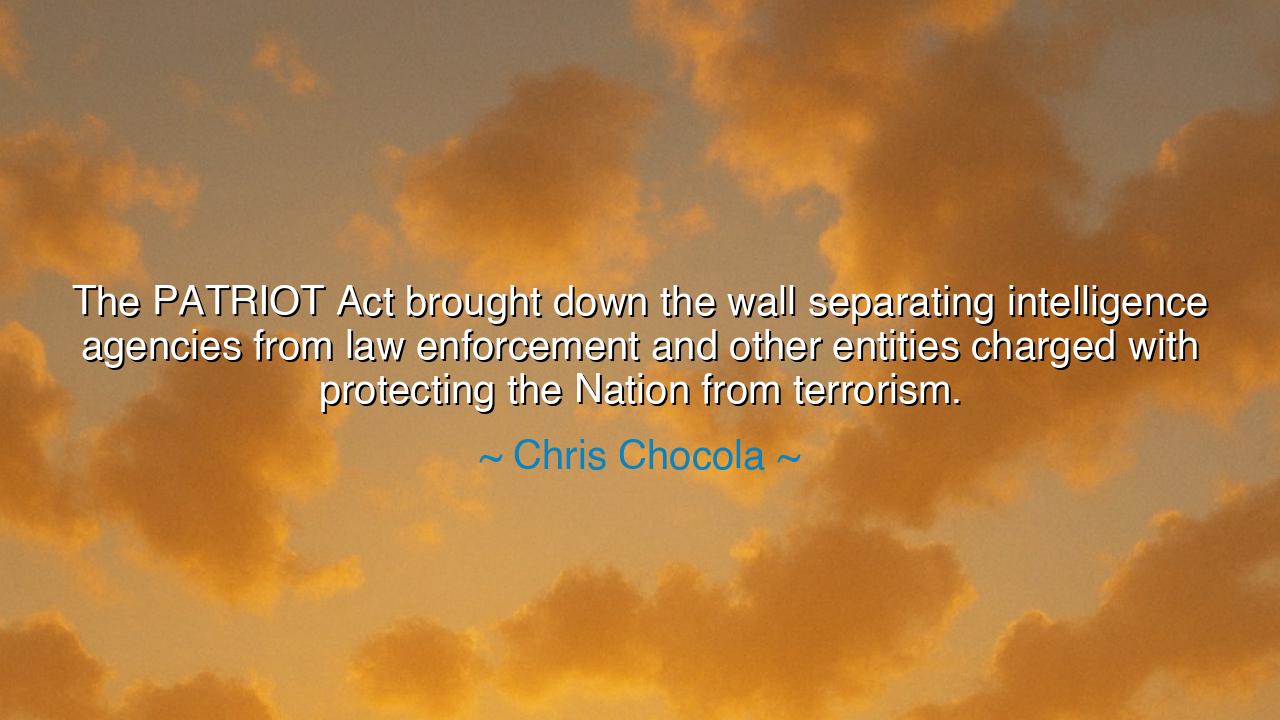
The PATRIOT Act brought down the wall separating intelligence
The PATRIOT Act brought down the wall separating intelligence agencies from law enforcement and other entities charged with protecting the Nation from terrorism.






“The PATRIOT Act brought down the wall separating intelligence agencies from law enforcement and other entities charged with protecting the Nation from terrorism.” Thus spoke Chris Chocola, an American legislator reflecting upon one of the most decisive shifts in the modern history of governance and security. His words emerged from the stormy aftermath of the September 11th attacks, when a wounded nation sought to understand how terror had pierced its heart despite all its guardians and all its power. This statement, though steeped in the language of policy, carries the weight of an ancient truth — that when knowledge is divided, even strength becomes weakness, and when the walls within a fortress grow higher than the walls that guard it, ruin follows from within.
The PATRIOT Act, born in those fearful and fervent days, was both a response and a reckoning. It sought to unite what had long been separated — the realms of intelligence and law enforcement, which, by tradition and law, had operated apart. Before its passage, the CIA, FBI, NSA, and local law enforcers each held fragments of a vast puzzle: information scattered like stars, bright but unconnected. Warnings existed, clues abounded, yet they lay in silence, trapped behind the walls of classification and mistrust. What Chocola called “the wall” was not made of stone, but of policy, rivalry, and fear — barriers erected over decades to prevent misuse of power, yet which in their rigidity prevented the joining of forces in a moment of peril.
To bring down the wall was not a small act. It was a recognition that in the age of invisible enemies, unity of knowledge was as essential as strength of arms. The PATRIOT Act, in Chocola’s vision, was not merely a law but a reformation of the nation’s soul — an attempt to restore coherence to its defenders, to ensure that the watchers and the wardens might finally see through the same eyes. Like the unification of scattered kingdoms in ancient times, this act was born of necessity and sealed by sacrifice. For when the empire of safety is divided, even the smallest foe can find passage through its cracks.
In the history of nations, there are many such walls — some physical, others unseen. Consider the fate of Byzantium, the great Eastern empire that stood for centuries as a beacon of civilization. Its defenses were mighty, its walls famed throughout the world. Yet when the Ottoman Turks came, it was not brute force alone that felled the city, but disunity within — generals who did not share intelligence, allies who distrusted one another, priests and princes divided by pride. The fall of Constantinople, like the tragedy of September 11th, teaches that no wall can protect a people who do not trust and communicate within it. Chocola’s words echo this ancient lesson: that barriers meant to preserve purity can, in the end, prevent salvation.
Yet even as his quote celebrates unity, it whispers a note of caution. For the destruction of walls brings both power and peril. When the gates of knowledge are thrown open, when information flows freely between agencies and hands of authority, the potential for abuse grows as well. The same wall that prevents collaboration can also prevent tyranny. Thus, Chocola’s declaration, though triumphant, carries the shadow of moral responsibility — the eternal struggle between security and liberty, between the vigilance that protects and the oversight that restrains. The ancients, too, wrestled with this duality: the philosopher Plato warned that unchecked guardians might themselves become the tyrants they sought to prevent.
In this balance lies the deeper meaning of Chocola’s reflection. The wall, whether in government or in the human soul, must never stand so tall that it prevents understanding, nor fall so low that it invites chaos. The PATRIOT Act was the manifestation of a nation’s desperate will to learn from its suffering — to see, to listen, to connect — and though it achieved much, it also reminded the world that power shared without wisdom becomes danger reborn. The act’s enduring lesson is that unity, to endure, must be guided by conscience; coordination must serve justice, not merely efficiency.
Therefore, O listener, take this wisdom into your own life. Learn from the story of these walls and their falling. Do not let the divisions of pride or fear isolate you from those who might stand beside you. In your family, your work, your community — tear down the barriers that silence truth and separate purpose. Share knowledge, build trust, and remember that protection, whether of nations or of hearts, is strongest when it is shared. But guard also the sanctity of freedom; let unity never become domination, and cooperation never become control.
For as Chris Chocola reminds us, the walls that divide can be as deadly as the threats they seek to defend against. When knowledge, courage, and moral restraint stand together, a people cannot easily fall. Let us, then, be the wise builders of a new kind of fortress — one made not of secrecy and suspicion, but of trust, wisdom, and shared vigilance, a foundation strong enough to endure through all the tempests of time.






AAdministratorAdministrator
Welcome, honored guests. Please leave a comment, we will respond soon